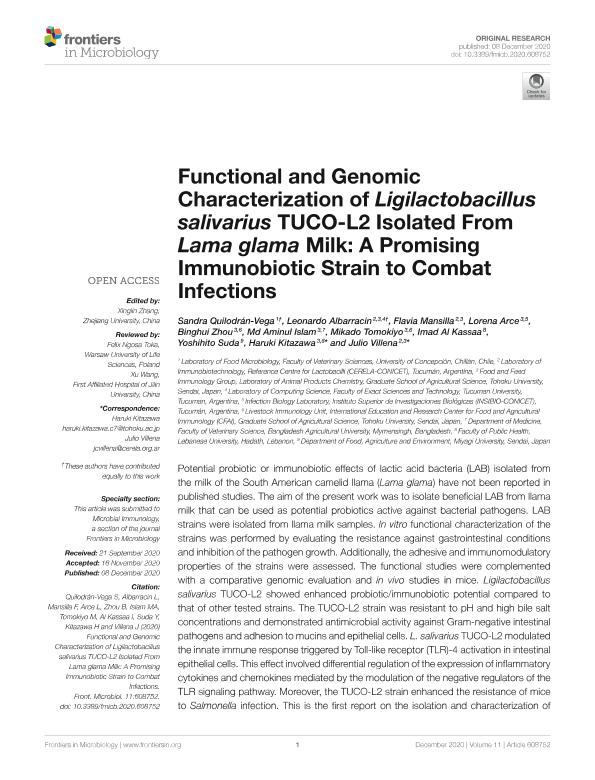Mostrar el registro sencillo del ítem
dc.contributor.author
Quilodrán Vega, Sandra

dc.contributor.author
Albarracín, Leonardo Miguel

dc.contributor.author
Mansilla, Flavia Ivana

dc.contributor.author
Arce, Lorena Paola

dc.contributor.author
Zhou, Binghui
dc.contributor.author
Islam, Md Aminul

dc.contributor.author
Tomokiyo, Mikado
dc.contributor.author
Al Kassaa, Imad
dc.contributor.author
Suda, Yoshihito
dc.contributor.author
Kitazawa, Haruki

dc.contributor.author
Villena, Julio Cesar

dc.date.available
2021-05-07T12:40:28Z
dc.date.issued
2020-12
dc.identifier.citation
Quilodrán Vega, Sandra; Albarracín, Leonardo Miguel; Mansilla, Flavia Ivana; Arce, Lorena Paola; Zhou, Binghui; et al.; Functional and genomic characterization of ligilactobacillus salivarius TUCO-L2 isolated from lama glama milk: a promising immunobiotic strain to combat infections; Frontiers Media S.A.; Frontiers in Microbiology; 11; 12-2020; 1-24; 608752
dc.identifier.issn
1664-302X
dc.identifier.uri
http://hdl.handle.net/11336/131643
dc.description.abstract
Potential probiotic or immunobiotic effects of lactic acid bacteria (LAB) isolated from the milk of the South American camelid llama (Lama glama) have not been reported in published studies. The aim of the present work was to isolate beneficial LAB from llama milk that can be used as potential probiotics active against bacterial pathogens. LAB strains were isolated from llama milk samples. In vitro functional characterization of the strains was performed by evaluating the resistance against gastrointestinal conditions and inhibition of the pathogen growth. Additionally, the adhesive and immunomodulatory properties of the strains were assessed. The functional studies were complemented with a comparative genomic evaluation and in vivo studies in mice. Ligilactobacillus salivarius TUCO-L2 showed enhanced probiotic/immunobiotic potential compared to that of other tested strains. The TUCO-L2 strain was resistant to pH and high bile salt concentrations and demonstrated antimicrobial activity against Gram-negative intestinal pathogens and adhesion to mucins and epithelial cells. L. salivarius TUCO-L2 modulated the innate immune response triggered by Toll-like receptor (TLR)-4 activation in intestinal epithelial cells. This effect involved differential regulation of the expression of inflammatory cytokines and chemokines mediated by the modulation of the negative regulators of the TLR signaling pathway. Moreover, the TUCO-L2 strain enhanced the resistance of mice to Salmonella infection. This is the first report on the isolation and characterization of a potential probiotic/immunobiotic strain from llama milk. The in vitro, in vivo, and in silico investigation performed in this study reveals several research directions that are needed to characterize the TUCO-L2 strain in detail to position this strain as a probiotic or immunobiotic that can be used against infections in humans or animals, including llama.
dc.format
application/pdf
dc.language.iso
eng
dc.publisher
Frontiers Media S.A.

dc.rights
info:eu-repo/semantics/openAccess
dc.rights.uri
https://creativecommons.org/licenses/by/2.5/ar/
dc.subject
BACTERIAL INFECTION
dc.subject
IMMUNOMODULATION
dc.subject
INTESTINAL EPITHELIA CELL
dc.subject
LAMA GLAMA MILK
dc.subject
LIGILACTOBACILLUS SALIVARIUS TUCO-L2
dc.subject
PROBIOTIC
dc.subject.classification
Biología Celular, Microbiología

dc.subject.classification
Ciencias Biológicas

dc.subject.classification
CIENCIAS NATURALES Y EXACTAS

dc.title
Functional and genomic characterization of ligilactobacillus salivarius TUCO-L2 isolated from lama glama milk: a promising immunobiotic strain to combat infections
dc.type
info:eu-repo/semantics/article
dc.type
info:ar-repo/semantics/artículo
dc.type
info:eu-repo/semantics/publishedVersion
dc.date.updated
2021-02-10T20:44:42Z
dc.identifier.eissn
1664-302X
dc.journal.volume
11
dc.journal.pagination
1-24; 608752
dc.journal.pais
Suiza

dc.journal.ciudad
Lausana
dc.description.fil
Fil: Quilodrán Vega, Sandra. Universidad de Concepción; Chile
dc.description.fil
Fil: Albarracín, Leonardo Miguel. Consejo Nacional de Investigaciones Científicas y Técnicas. Centro Científico Tecnológico Conicet - Tucumán. Centro de Referencia para Lactobacilos; Argentina. Universidad Nacional de Tucumán. Facultad de Ciencias Exactas y Tecnología; Argentina. Tohoku University; Japón
dc.description.fil
Fil: Mansilla, Flavia Ivana. Consejo Nacional de Investigaciones Científicas y Técnicas. Centro Científico Tecnológico Conicet - Tucumán. Centro de Referencia para Lactobacilos; Argentina. Tohoku University; Japón
dc.description.fil
Fil: Arce, Lorena Paola. Consejo Nacional de Investigaciones Científicas y Técnicas. Centro Científico Tecnológico Conicet - Tucumán. Instituto Superior de Investigaciones Biológicas. Universidad Nacional de Tucumán. Instituto Superior de Investigaciones Biológicas; Argentina. Tohoku University; Japón
dc.description.fil
Fil: Zhou, Binghui. Tohoku University; Japón
dc.description.fil
Fil: Islam, Md Aminul. Tohoku University; Japón. Bangladesh Agricultural University; Bangladesh
dc.description.fil
Fil: Tomokiyo, Mikado. Tohoku University; Japón
dc.description.fil
Fil: Al Kassaa, Imad. Lebanese University. Faculty of Public Health; Líbano
dc.description.fil
Fil: Suda, Yoshihito. Miyagi University; Japón
dc.description.fil
Fil: Kitazawa, Haruki. Tohoku University; Japón
dc.description.fil
Fil: Villena, Julio Cesar. Consejo Nacional de Investigaciones Científicas y Técnicas. Centro Científico Tecnológico Conicet - Tucumán. Centro de Referencia para Lactobacilos; Argentina. Tohoku University; Japón
dc.journal.title
Frontiers in Microbiology
dc.relation.alternativeid
info:eu-repo/semantics/altIdentifier/doi/http://dx.doi.org/10.3389/fmicb.2020.608752
dc.relation.alternativeid
info:eu-repo/semantics/altIdentifier/url/https://www.frontiersin.org/articles/10.3389/fmicb.2020.608752
Archivos asociados
